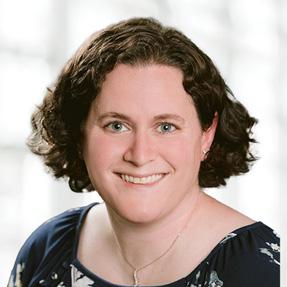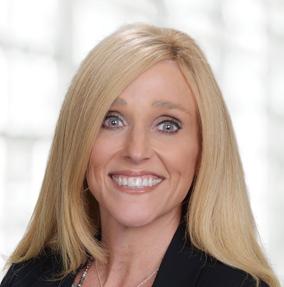
8 minute read
Bridging Gaps, Building Bridges
Bridging Gaps, Building Bridges: How AON’s APPs Are Strengthening Cancer Care and Each Other
Across AON’s national network, Advanced Practice Providers (APPs) are not only addressing critical gaps in oncology care but also cultivating a stronger, more interconnected professional community. AON is empowering APPs by providing specialized education, fostering peer connections, and amplifying their voices, ensuring they have the support necessary to thrive and continue delivering top-quality care to patients.
The Skill to Fill Critical Care Gaps
As cancer incidence rises in the U.S.—driven by increasing cases among young adults and the higher cancer risk associated with an aging population—the field of oncology faces a worsening shortage of physicians. In 2024, cancer cases surpassed 2 million for the first time in history, with numbers expected to keep growing. Compounding this crisis, 53% of oncologists report experiencing burnout, with 41% considering leaving medicine due to its severity, creating an unprecedented challenge in cancer care.
Amid these dire statistics, Advanced Practice Providers (APPs)—including Nurse Practitioners (NPs) and Physician Assistants (PAs)—are bridging the gap, delivering high-quality care while easing the burden on overextended oncologists and healthcare systems.
Well-trained to manage a wide range of responsibilities, APPs ensure that patients receive essential care. Their ability to work independently and collaborate with physicians allows for seamless continuation of care.
APPs are stepping up in a major way," says Susan Sabo-Wagner, vice president of clinical innovation and leader of care coordination at AON. “They’re incredibly adaptable, capable of taking on a wide range of roles. Whether it’s seeing patients in tandem with physicians or managing urgent care cases, APPs help ease the burden on oncology teams. And in our valuebased care model, keeping patients out of the hospital is a key priority. APPs are critical in achieving that.
Patients often don’t realize that APPs are highly educated professionals with advanced degrees and extensive clinical experience. Through rigorous training, they gain the skills needed to assess, diagnose, treat, and manage a wide range of conditions, including cancer. Nurse practitioners typically hold a Master’s degree or higher and are board-certified in their specialties, while physician assistants complete advanced degree programs and pass national certification exams.
One oncologist who has seen their impact firsthand is Dr. Jeanna Knoble, a leader at Zangmeister Cancer Center in Columbus, Ohio. "We have grown our APP program significantly in the last few years. There have been challenges in adaptation, both with patients hesitant to embrace the change and physicians learning how to best utilize our APP providers in daily practice," Dr. Knoble admits. “But over time, our APPs have become one of our most valued resources, improving continuity and accessibility of patient care. Through working together and communicating closely, our APPs allow us to provide high quality care more efficiently and comprehensively. At the same time, this model helps us avoid work commitment overload, and physician burnout.
Building Trust: APPs as Pillars of Patient Care
Despite the high level of training and expertise APPs bring to patient care, some patients remain hesitant to see them, expecting to interact exclusively with a physician. Educating patients on the value of APPs is an ongoing effort within AON, and perceptions are shifting. As more patients experience firsthand the care, compassion, and expertise APPs provide, they increasingly recognize them as essential partners in their cancer journey.
“APPs provide continuity, reassurance, and advocacy for our patients,” says Katie Alexander, an APRN at Zangmeister Cancer Center and AON’s regional advanced practitioner coordinator. “We make sure patients feel heard, cared for, and confident that they are receiving the best possible care—even when their oncologist is being pulled in multiple directions.”
For cancer patients, navigating their diagnosis and treatment can be overwhelming, and access to care providers is essential. However, in a fast-paced oncology practice, physicians are often stretched thin, leaving patients with lingering questions or concerns. APPs play a crucial role in ensuring no patient feels left behind. They provide highly specialized care and offer an empathetic, personal touch that can make all the difference in a cancer patient’s experience.
Fostering Community and Elevating the Voice of APPs
APPs are often the bridge between patients and comprehensive cancer care. Their role is expanding as they provide more direct care and manage long-term survivorship, significantly improving patient outcomes.

Alexander has been leading AON’s initiative to create a national community of APPs, connecting providers across practices, no matter their location, with the goal of having a leader to unify APPs in each AON region. Many APPs were working without a connection to the broader AON community before she took on the task of uniting them.
“We recognized that APPs needed visibility, representation, and leadership opportunities,” Alexander explains. “By giving them a voice and bringing them together through committees, we’re empowering them in new ways.”
Alexander’s approach to community-building has been multifaceted. She is establishing committees within the APP network where providers can collaborate on best practices, develop new initiatives, and share experiences. These committees also address specific challenges, such as varying state practice laws and navigating different oncology specialties like survivorship care.
“There was a clear gap in communication,” says Sabo-Wagner. “APPs didn’t have a strong voice within the organization, and that needed to change. Katie’s work connecting APPs across the network has been transformative. Now they have a place for support and guidance.”
Sabo-Wagner is optimistic about the committees’ potential to strengthen the community. "The committees will be integral not just in supporting APPs, but in allowing them to shape their role in cancer care," she says. “For instance, one committee will focus on survivorship clinics. APPs are uniquely qualified to lead these, and we want them to develop processes and procedures for others to follow.”
Professional Development to Cultivate Oncology Expertise
Alexander launched the APPs initiative by setting up a dedicated portal on AON’s SharePoint intranet, which has become an essential resource for educational materials, tools, and oncology-specific information. The committees and the portal are connecting APPs who may never have met otherwise and are providing opportunities for them to learn from each other.
"The SharePoint page has been a game changer," Alexander notes. "It’s become a central hub where APPs can access the knowledge they need to succeed in oncology, and more importantly, it’s a place where they can connect with their peers and build relationships that ensure they’re well-supported."

AON’s focus on providing education and support ensures APPs are well-equipped to face challenges. "We want APPs to be at the top of their game," Alexander adds. "That’s why offering specialized oncology training is so crucial."
Although APPs have long been a critical part of the healthcare workforce, their role is often undervalued, especially in oncology. AON is changing that by providing APPs with the education and support they need to excel in their clinical roles and gain recognition within the organization.
This elevation of the APP role within AON is vital not only for the APPs themselves but also for the broader healthcare system. As more physicians and healthcare leaders recognize the value of APPs, AON is leading the way in promoting their essential contributions to cancer care.
Dr. Knoble credits Alexander’s leadership and AON’s support for helping successfully integrate APPs into the cancer care model. "Katie and her team have created a program that benefits everyone. Physicians see how APPs are enhancing patient care, and the APPs themselves feel empowered and supported," she says.
This partnership between physicians and APPs is essential to the ongoing success of AON’s cancer care delivery model. As Dr. Knoble explains, “The collaboration between physicians and APPs is crucial. We need to work as a team to provide the best care possible to our patients.”
A Critical Force in the Future of Cancer Care
This rapidly growing profession is poised to make an even greater impact in healthcare. APPs are among the fastestgrowing professions in the United States. According to the U.S. Bureau of Labor Statistics, demand for nurse practitioners and physician assistants is expected to grow significantly, much faster than the average for all occupations. Similarly, U.S. News & World Report’s Best STEM Jobs ranking placed nurse practitioners and physician assistants in the top ten, reflecting the increasing demand for these professionals.
With Alexander leading the charge, AON’s APPs are not just responding to today’s challenges but are shaping the future of cancer care. By creating a supportive community, offering continued education, and empowering these providers with a voice, AON is building bridges between healthcare teams and strengthening cancer care at every level.
We're at a pivotal moment in healthcare, and APPs are more important than ever. By uniting them through education and collaboration, we're not just filling gaps—we're creating a stronger, more cohesive national community that benefits patients, providers, and the entire organization.

Advanced Practice Provider Lingo: Making Sense of Titles and Credentials
For patients and even some healthcare professionals, the many acronyms representing the titles and credentials of Advanced Practice Providers (APPs) can be confusing. However, understanding these distinctions is key to appreciating the depth of training, expertise, and specialized care APPs bring to community-based oncology. Here’s a breakdown of common acronyms and their corresponding credentials:
APRN: Advanced Practice Registered Nurse
Credentials:
CNP: Certified Nurse Practitioner
CNS: Clinical Nurse Specialist
CRNA: Certified Registered Nurse Anesthetist
NP: Nurse Practitioner
Credentials:
FNP: Family Nurse Practitioner
AGNP: Adult-Gerontology Nurse Practitioner
WHNP: Women's Health Nurse Practitioner
PA: Physician Assistant
Credential:
PA-C: Physician Assistant-Certified
CNS: Clinical Nurse Specialist
Credentials:
ACNS-BC: Adult Clinical Nurse Specialist-Board Certified
PCCN: Progressive Care Certified Nurse
CRNA: Certified Registered Nurse Anesthetist
Credential:
DNAP: Doctor of Nurse Anesthesia Practice






